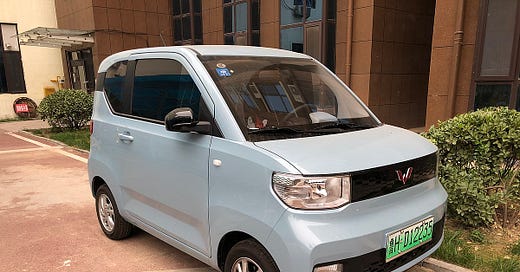By its nature, an electric vehicle (EV) is a simple machine. It’s a battery on wheels. The motor driving the wheels is a generator running in reverse. There’s no need for a transmission since the motor can spin to the top speed of the car. Battery, motor, drive train, wheels, and a steering mechanism are all you need.
Because battery technology wasn’t very good a decade ago, Tesla added tons of bells and whistles. This mainly involved computer chips and software, which were deemed cheap. To lure the high-end customers needed to make a profit, Tesla offered luxury appointments. As production scaled per-unit costs dropped, allowing Tesla to go down-market. Prices are now in line with those of the average car.
But in trying to copy Tesla’s strategy, rival car makers lost the plot. They built heavy, feature-laden cars that needed very heavy batteries. In the trade-off among range, size, features, and price, price lost out.
The result is now clear. Most Americans can’t afford EVs. They don’t trust EVs. People who don’t have homes with parking and electric connections won’t touch EVs.
There is a way through all this. Make EVs smaller. We can do that. The Hounguang Mini, made by a joint venture that includes General Motors, sells for just $5,000. BYD is building a car called the Seagull that costs a little over $10,000 and can run for up to 250 miles per charge. The average BYD model now costs $30,000, a little more than half the Tesla’s price. They’re beating Tesla in China.
There’s also a way through this that doesn’t involve copying BYD. Make EVs modular.
Today’s batteries aren’t as good as tomorrow’s will be. Why can’t they be replaced easily through standard connectors, the way China’s Nio swaps out current batteries? The same goes with electronics. Why can’t you sell a basic EV, without all the self-driving promises, then add those capabilities through the aftermarket? The model would be the old IBM PC, which had standard connectors and could be upgraded with memory and faster processors at customer discretion.
EVs are a technology market, not a manufacturing market. They’re constantly changing, getting cheaper, providing more value, just as with PCs a generation ago.
Better batteries are coming. The computers and software that enhance safety get better and cheaper all the time. Gas powered cars have a huge aftermarket, where people can customize their rides. Why don’t EVs?
There is no reason why EVs must be the way they are. There are dozens of car companies trying to follow in Tesla’s wake. The way to do that is to innovate, making EVs affordable, modular, and upgradeable.
Unless you want to lose the market to China.





You make an excellent point, Scott. We need to turn around.
Americans are on a one-way highway to bigger and bigger vehicles. Smaller vehicles don't sell.